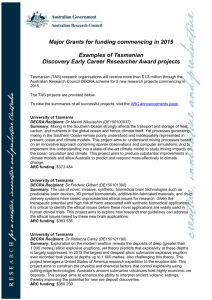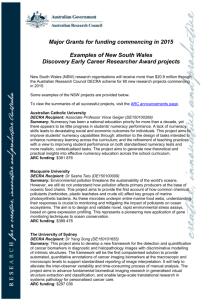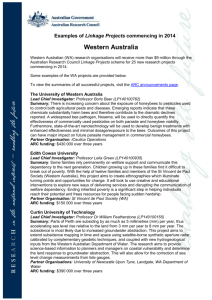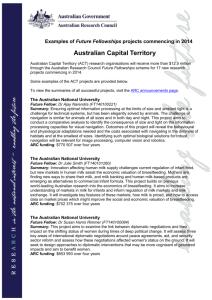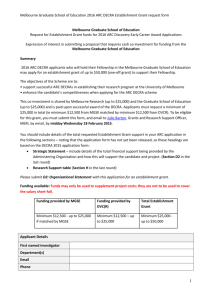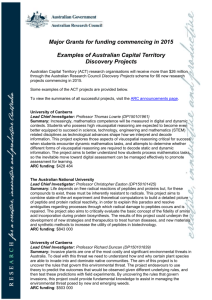Word Format - Australian Research Council
advertisement
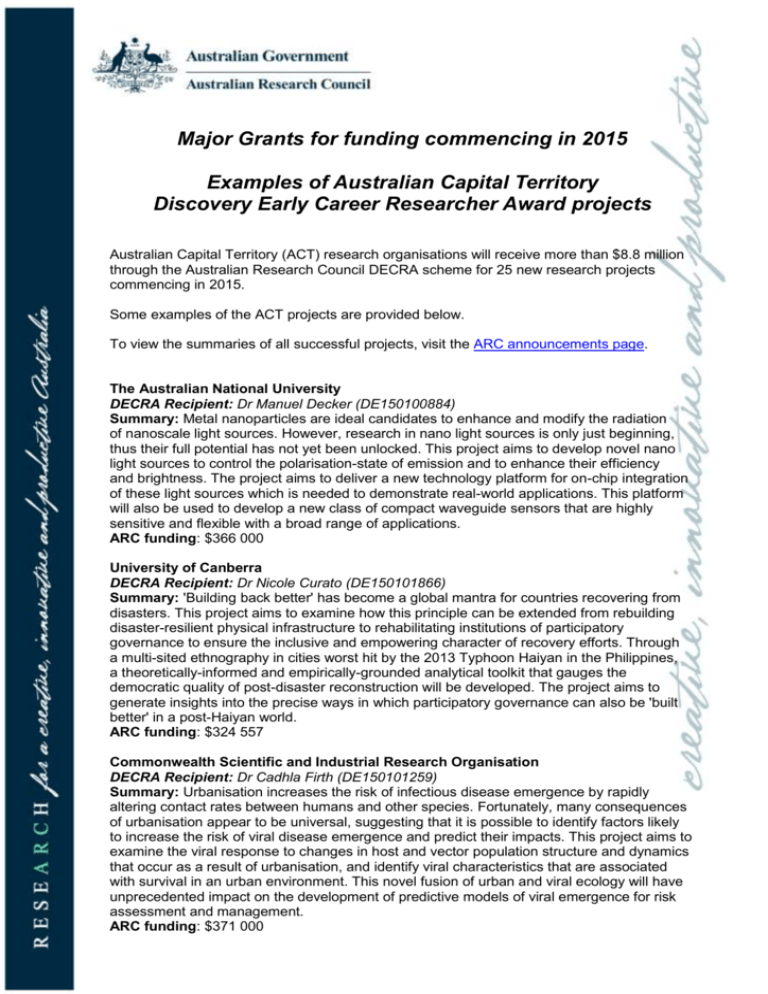
Major Grants for funding commencing in 2015 Examples of Australian Capital Territory Discovery Early Career Researcher Award projects Australian Capital Territory (ACT) research organisations will receive more than $8.8 million through the Australian Research Council DECRA scheme for 25 new research projects commencing in 2015. Some examples of the ACT projects are provided below. To view the summaries of all successful projects, visit the ARC announcements page. The Australian National University DECRA Recipient: Dr Manuel Decker (DE150100884) Summary: Metal nanoparticles are ideal candidates to enhance and modify the radiation of nanoscale light sources. However, research in nano light sources is only just beginning, thus their full potential has not yet been unlocked. This project aims to develop novel nano light sources to control the polarisation-state of emission and to enhance their efficiency and brightness. The project aims to deliver a new technology platform for on-chip integration of these light sources which is needed to demonstrate real-world applications. This platform will also be used to develop a new class of compact waveguide sensors that are highly sensitive and flexible with a broad range of applications. ARC funding: $366 000 University of Canberra DECRA Recipient: Dr Nicole Curato (DE150101866) Summary: 'Building back better' has become a global mantra for countries recovering from disasters. This project aims to examine how this principle can be extended from rebuilding disaster-resilient physical infrastructure to rehabilitating institutions of participatory governance to ensure the inclusive and empowering character of recovery efforts. Through a multi-sited ethnography in cities worst hit by the 2013 Typhoon Haiyan in the Philippines, a theoretically-informed and empirically-grounded analytical toolkit that gauges the democratic quality of post-disaster reconstruction will be developed. The project aims to generate insights into the precise ways in which participatory governance can also be 'built better' in a post-Haiyan world. ARC funding: $324 557 Commonwealth Scientific and Industrial Research Organisation DECRA Recipient: Dr Cadhla Firth (DE150101259) Summary: Urbanisation increases the risk of infectious disease emergence by rapidly altering contact rates between humans and other species. Fortunately, many consequences of urbanisation appear to be universal, suggesting that it is possible to identify factors likely to increase the risk of viral disease emergence and predict their impacts. This project aims to examine the viral response to changes in host and vector population structure and dynamics that occur as a result of urbanisation, and identify viral characteristics that are associated with survival in an urban environment. This novel fusion of urban and viral ecology will have unprecedented impact on the development of predictive models of viral emergence for risk assessment and management. ARC funding: $371 000 The Australian National University DECRA Recipient: Dr Benjamin Schwessinger (DE150101897) Summary: Fungal crop pathogen epidemics lead to severe yield losses worldwide, impact national economies and individual human lives. Wheat stripe rust fungal epidemics caused by new virulent races can lead to 80 per cent reduction in yield. This project aims to investigate the molecular mechanisms leading to newly virulent races by whole genome, epigenome and transcriptome comparison of several wheat stripe rust races. This project aims to fundamentally advance our understanding of evolutionary forces driving virulence and specification at the whole (epi-)genome level in important fungal crop pathogens. This will promote new crop protection strategies important for local and global food security in an ever-changing environment. ARC funding: $341 000 The Australian National University DECRA Recipient: Dr Ryan Phillips (DE150101720) Summary: Specialised pollination systems are of global scientific importance because they offer unique insights into speciation and are exceptionally vulnerable to anthropogenic change. Fundamental gaps remain in our knowledge of the adaptations required for specialisation, the ecological processes favouring its evolution, and whether specialisation facilitates or constrains floral evolution. This project aims to address these questions in a unique and diverse group of Australian orchids that are pollinated by sexual mimicry. This work will apply experimental, ecological and phylogenetic approaches to understand the visual and chemical adaptations to sexual mimicry and their consequences for species diversification, floral evolution and conservation. ARC funding: $386 923 The Australian National University DECRA Recipient: Dr Daniel Noble (DE150101774) Summary: Early developmental environments can profoundly influence the survival and reproductive success of organisms, including humans. The project aims to use an exceptional model lizard system to test a new theory about how personality and learning are influenced through the manipulation of offspring environment and how this affects lifetime fitness. Understanding these effects is important for predicting the responses to selection imposed by changing environments, the success of re-introduction programs for threatened species, and for understanding the long-term viability of populations. This project aims to merge theoretical developments in life history theory and evolutionary biology and contribute important empirical advances to a new research field. ARC funding: $372 000
